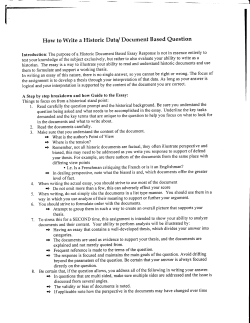
Emily Mediate Advisor Name
Student Name: Emily Mediate Advisor Name: Terence McDonnell Award Level: Senior/Honors Thesis Award: Honorable Mention Project Title: Disabling Donor Demands: The Coercion of the International HIV/AIDS Agenda College(s): A&L, Science Major(s): Africana Studies, Pre-‐Medicine Graduation Year: 2015 Emily Mediate When I started preparing for my thesis in the fall of my junior year, my consultation of library resources began in these early stages of the research process. While studying abroad in London, I took advantage of the Hesburgh library’s electronic resources and developed a preliminary literature review to help me finalize a research question. I used databases, articles, and e-books to explore the broad topic that I was interested in: foreign aid directed towards health interventions in Uganda. The Notre Dame London Undergraduate Program librarian, Alice Tyrell, also helped me throughout this semester abroad. She showed me how to request and receive documents from campus through the inter-library loan electronic delivery system and chat with a librarian on the Hesburgh library’s website. She also directed me to the Westminster Reference Library in London, which boasts an extensive Africana Studies section. At the end of this semester, I had narrowed my topic to the study of international HIV/AIDS funding programs in Uganda. Moreover, I had found a research question: “How has international HIV/AIDS funding constrained local efforts in Uganda?” While the Hesburgh library was incredibly useful in these stages of background research and literature review, I believe that the library was most beneficial in the data development, collection, and analysis stages of my thesis process. During the spring semester of my junior year, as I developed the independent field research project that would allow me to answer my research question, I consulted with the Hesburgh librarian Doug Archer about the pieces of data that I needed to collect to answer my question. This meeting helped me to develop the interview questions that would interrogate the relationship between international funding and organizational capacity for HIV/AIDS interventions. I thought critically about how the data that I collected would provide the connection between these two variables. When I realized that the archives at the Ugandan Ministry of Health would complement these interviews, the Kellogg Institute Visiting Faculty Fellow Alice Wiemers (who has over ten years of experience with archives in Ghana) advised me on the archival research aspect of my project. While in Uganda, then, I felt well equipped to collect my data. I recorded and transcribed my interviews and took ethnographic notes using Spradley’s nine dimensions (space, actor, activity, object, act, event, time, goal, and feeling). The archival data that I gathered simultaneously consisted of primary institutional documents: records on foreign medical personnel that had not yet been digitized and reports in the Ugandan government archives about major programs for HIV/AIDS. For the foreign medical personnel records, I entered all 2600 hard copies into a single Excel document, since this benefitted my research but also allowed the Ministry to initiate an electronic record-keeping system. For the other documents, I took copious handwritten notes and consulted heavily with the archivist in Kampala who pointed me towards the most useful files. After collecting all of this data, I entered a stage of querying my data that allowed me to evaluate, manage, and organize the substantial amount of information I generated. During this process, my primary thesis advisor Terry McDonnell was incredibly helpful. He advised that I use an inductive research method to begin generating keywords within my interview transcripts. These keywords signaled key passages of interest and allowed me to formulate my primary findings. Throughout this process, the library’s classes at the Center for Digital Scholarship were also critical in the analysis and interpretation of my data. From the text-mining course that allowed me to extract as much meaning as possible from my interviews to the Stata course that helped me to generate statistics from my Excel document of foreign medical personnel, the CDS was invaluable in the data synthesis and analysis process. Moreover, the data visualization and Voyant tools courses helped me to construct an aesthetically pleasing and informational Powerpoint presentation that I delivered at three different national conferences. In this way, I was able to analyze the data generated from my fieldwork and apply it back to the existing literature on my research topic through my thesis paper. Briefly, I also conducted a brief supplementary research project in the Netherlands and Sweden on models of best practice for HIV/AIDS interventions. The archival data that I collected at the Nordic Africa Institute and my interviews with foreign aid organizations and government agencies served as a supplement to my primary thesis research. I applied a similar research methodology to this mini-project. Whether it was scanning a document in the library on campus, speaking with a Notre Dame librarian, or utilizing online resources, the Hesburgh library significantly facilitated my research process. Moreover, the library helped me to develop skills that will be useful in my post-graduate fellowship program, which involves a yearlong research-based evaluation of a particular organization’s HIV/AIDS programming in Uganda.
© Copyright 2025












